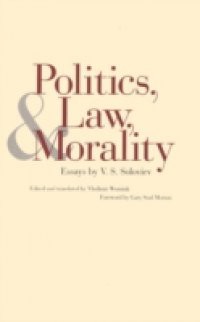Considered one of Russia’s greatest philosophers, Vladimir Soloviev (1853â1900) was also a theologian, historian, poet, and social and political critic. His works have emerged to enjoy renewed attention in postâSoviet Russia, and his concerns echo in contemporary discussions of politics, law, and morality. In this collection of Soloviev’s essaysâmany translated into English for the first timeâthe philosopher explores an array of social issues, from the death penalty to nationalism to women’s rights.Soloviev reacts against the tradition of European rationalist thought and seeks to synthesize religious philosophy, science, and ethics in the context of a universal Christianity. In these writings he reveals the centrality of human rights in his Christian worldview, not only as an abstract theory but also as an inspiration in everyday life. In a substantive introduction and copious annotations to the essays, Vladimir Wozniuk points out distinctive and often overlooked features of Soloviev’s works while illuminating his place within both the Russian and Western intellectual traditions.

